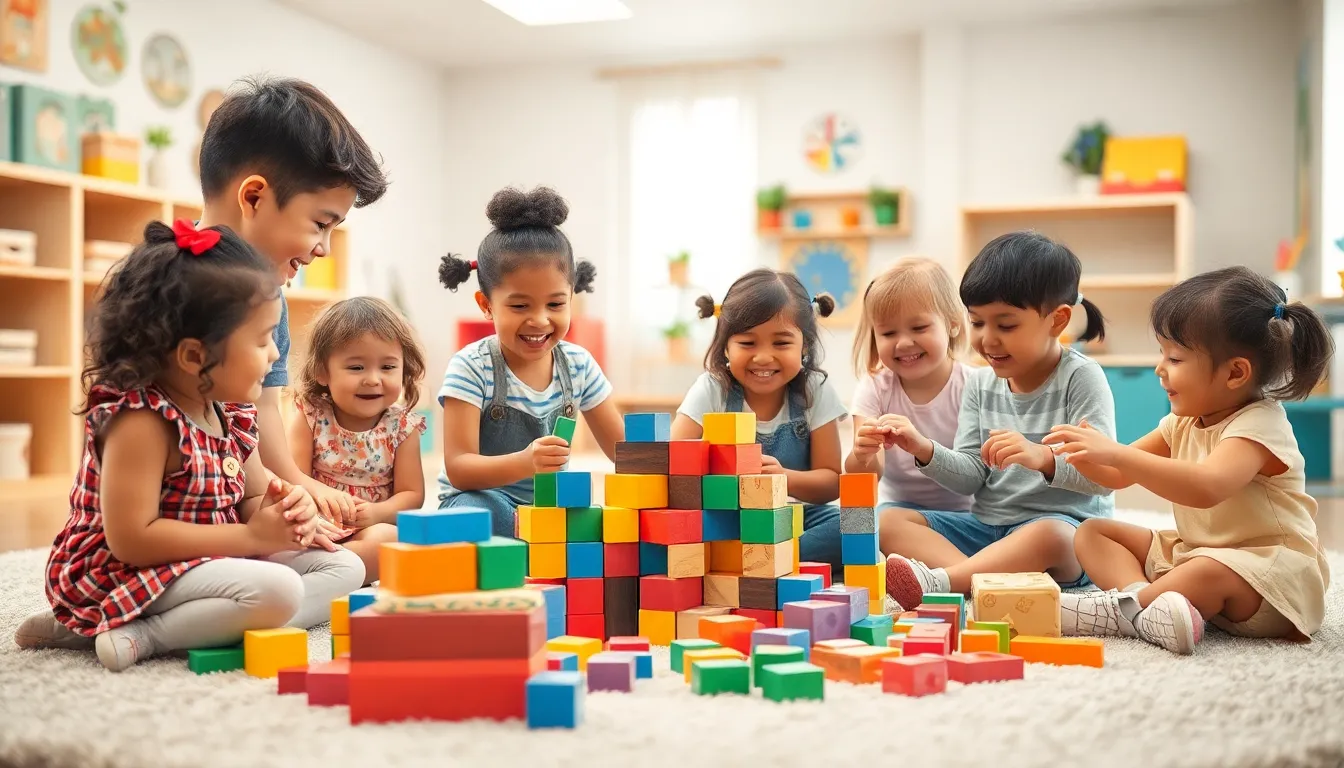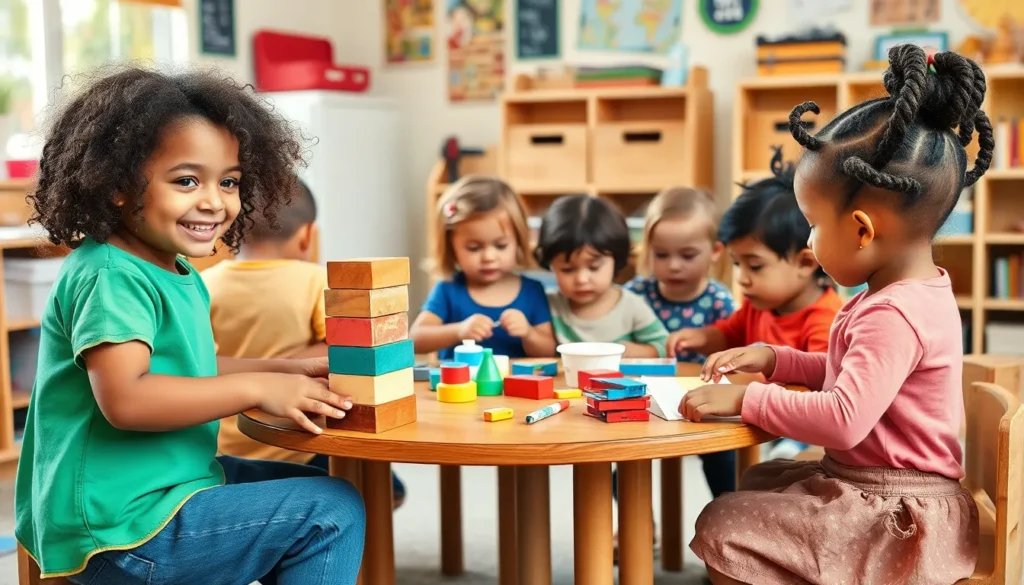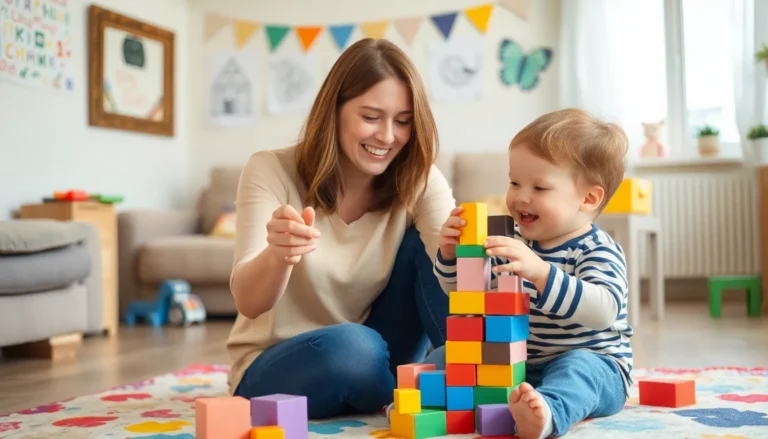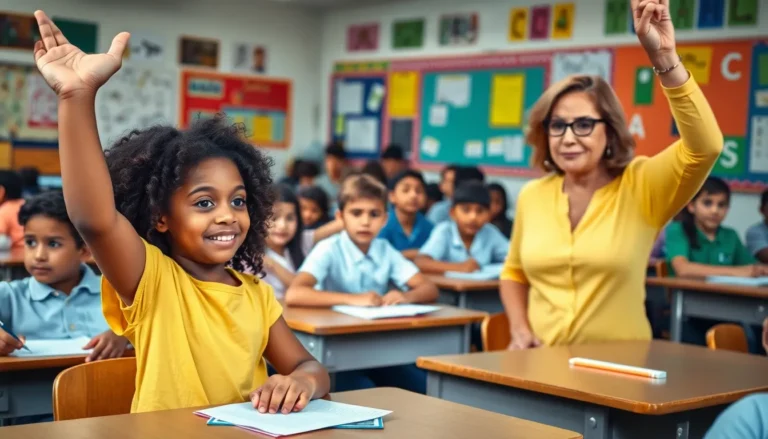Table of Contents
ToggleIn the bustling world of preschool, tiny humans embark on a grand adventure filled with laughter, learning, and the occasional crayon catastrophe. This vibrant environment isn’t just about nap times and snack breaks; it’s a rich tapestry of culture that shapes young minds and builds lifelong friendships. Imagine a place where sharing is as vital as breathing and where every day is an opportunity for imaginative play and discovery.
Understanding Preschool Culture
Preschool culture encompasses the social values, practices, and interactions that shape the daily experiences of young children. This culture is crucial in supporting the developmental needs of students in their formative years.
Definition of Preschool Culture
Preschool culture refers to the shared beliefs, traditions, and behaviors that emerge in early childhood settings. It includes interactions among children, teachers, and parents, creating a collaborative learning environment. Elements such as language, play, and social norms contribute to shaping this culture. Through these components, children learn to navigate their social worlds while developing emotional and cognitive skills.
Importance of Preschool Culture
Preschool culture plays a vital role in a child’s overall development. It fosters social skills through peer interaction and collaboration, essential for forming friendships. Involvement in diverse cultural activities enhances children’s understanding of community and cooperation. Children’s exposure to various perspectives helps promote tolerance and empathy. Strong preschool culture supports emotional well-being by providing a sense of belonging and security, laying the groundwork for future educational success.
Key Components of Preschool Culture

Preschool culture comprises several key components that significantly influence the developmental journey of young children. These elements include play-based learning, social interaction, and emotional development.
Play-Based Learning
Play-based learning serves as a fundamental element of preschool culture. Children engage in imaginative activities that foster cognitive skills. During play, they explore new concepts and solve problems. Materials like blocks, art supplies, and games encourage creativity and critical thinking. Educators facilitate these experiences by guiding children in cooperative play. This allows for the development of language skills as children communicate and negotiate their ideas. Through play, a sense of agency and independence emerges, laying the groundwork for lifelong learning.
Social Interaction
Social interaction plays a vital role in preschool culture by fostering relationships among children. Kids learn to navigate friendships and develop essential social skills. They practice sharing, taking turns, and resolving conflicts during group activities. Each interaction offers opportunities for communication and collaboration, enhancing their understanding of social cues. Teachers support these interactions, creating a safe environment where children feel comfortable expressing themselves. As they engage with peers, they develop empathy and respect for one another’s feelings, crucial for building a supportive community.
Emotional Development
Emotional development represents a core aspect of preschool culture, promoting well-being and resilience. Children gain awareness of their feelings and learn to express them appropriately. Through shared activities, they experience various emotions, fostering emotional intelligence. Teachers and caregivers play a crucial role by validating feelings and providing guidance. Creating a nurturing environment allows children to feel secure and valued. This emotional foundation supports healthy relationships and fortifies their ability to cope with challenges in the future.
Influences on Preschool Culture
Preschool culture is shaped by various influences, each contributing to the unique experiences that children encounter.
Family Dynamics
Family dynamics play a crucial role in molding preschool culture. Parents and caregivers impart values and beliefs that children bring into their preschool environment. Frequent communication between families and teachers enhances the understanding of a child’s needs and background. Events like family nights foster a sense of community while giving children exposure to diverse family structures. Such engagement builds strong relationships, positively impacting children’s adjustment and behavior in the preschool setting.
Community and Environment
The community surrounding a preschool significantly influences its culture. Local norms and traditions become integrated into daily activities and interactions amongst children and educators. Community involvement, through volunteer opportunities or partnerships with local organizations, enriches the preschool experience. Access to parks, libraries, and cultural centers stimulates children’s curiosity and learning. Ultimately, a supportive community cultivates an environment that enhances children’s emotional and social development.
Educational Philosophy
Educational philosophy establishes the foundation of preschool culture. Different approaches, such as Montessori, Reggio Emilia, and Waldorf, each emphasize unique aspects of child development. These philosophies guide curriculum design, teaching methods, and interactions among peers. Children become active participants in their learning journey when educators adopt a philosophy that aligns with their values. Prioritizing respect for children’s voices, interests, and needs results in a rich, engaging preschool atmosphere.
The Role of Educators in Shaping Preschool Culture
Educators play a crucial role in establishing and nurturing preschool culture. Their teaching strategies directly influence children’s learning experiences and overall development.
Teaching Strategies
Effective teaching strategies enhance engagement and foster a love for learning. Integrating play-based approaches captures children’s interests while promoting critical thinking and problem-solving skills. Incorporating storytelling enriches language development and creates connections between concepts. Utilizing hands-on activities encourages exploration and experimentation. Incorporating music and movement can stimulate creativity and build motor skills. Varied instructional techniques support diverse learning styles, ensuring all children thrive in the classroom.
Building Relationships
Strong relationships between educators and children create a trusting atmosphere. Taking the time to learn about each child’s interests establishes personal connections. Encouraging open communication allows children to express their feelings and thoughts. Nurturing a supportive environment helps children develop confidence and a sense of belonging. Regular family interactions strengthen these bonds, ensuring that teaching aligns with children’s home experiences. Celebrating each child’s achievements reinforces self-esteem and fosters social connections.
Creating an Inclusive Environment
An inclusive environment ensures every child feels valued and respected. Incorporating multicultural resources exposes children to diverse backgrounds, promoting empathy and understanding. Adapting the curriculum to reflect the unique needs of all learners supports equity in education. Providing opportunities for cooperative group work encourages teamwork and collaboration. Regularly assessing and addressing potential biases helps maintain fairness and inclusivity. Engaging families in school activities fosters a community that embraces diversity.
Challenges in Preschool Culture
Preschool culture faces various challenges that affect children’s development and learning experiences. Understanding these obstacles helps educators create effective solutions.
Cultural Diversity
Cultural diversity in preschool settings enriches children’s learning but also presents challenges. Educators must navigate differing values and practices from families that shape children’s perspectives. Incorporating multicultural activities promotes inclusivity and understanding, yet it requires careful planning. Training for teachers ensures cultural competence, enabling them to address diverse needs effectively. Communication with families plays a pivotal role, facilitating an environment where all cultural backgrounds are celebrated. By acknowledging and respecting cultural differences, preschools foster a sense of belonging among all students.
Adaptation to Change
Adapting to change poses significant challenges within preschool culture. The dynamic nature of educational methods influences how children interact and learn in the classroom. Teachers encounter new curriculum standards, technological resources, and teaching approaches frequently. While maintaining flexibility, educators must support children’s emotional adjustment during transitions. Regular training helps staff stay updated on best practices, ensuring they handle changes effectively. Engaging families in the adaptation process promotes collaboration and strengthens support networks for children. Overall, successful adaptation creates a resilient learning environment that nurtures children’s growth amidst change.
Preschool culture is a vibrant tapestry woven from the interactions and experiences that shape young children’s lives. It lays the groundwork for essential social and emotional skills while fostering a love for learning. By embracing play-based learning and nurturing relationships, educators create an environment where children thrive.
The influence of family and community further enriches this culture, promoting inclusivity and understanding. As preschool evolves, adapting to diverse needs and incorporating multicultural perspectives remains vital. This dynamic setting not only supports children’s growth but also prepares them for future challenges, ensuring they embark on their educational journeys with confidence and resilience.







